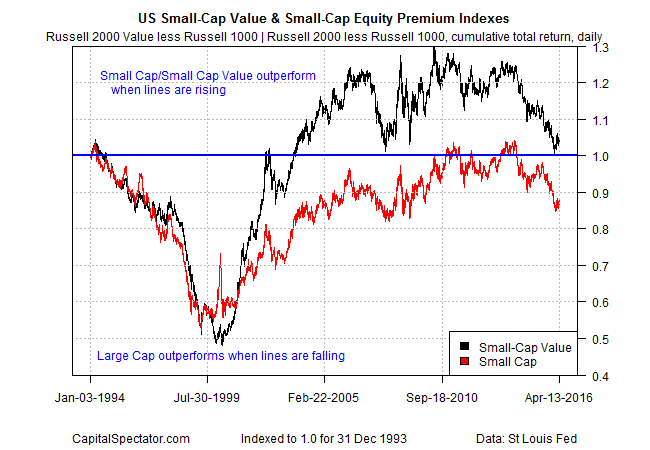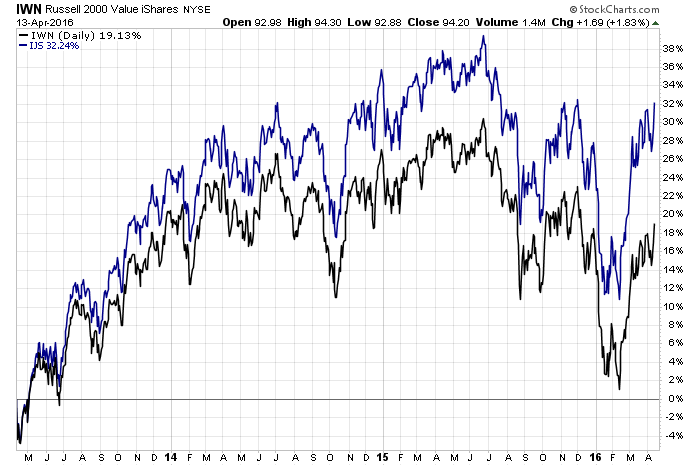The case for expecting a small-cap equity premium looks shaky. Can we rescue the strategy by focusing on small-cap value stocks? A cautious “yes” has merit, or so it appears after crunching the numbers on the relevant Russell indexes.
Market history over the past two decades-plus suggests that small companies priced at a relative discount earn higher returns over large cap stocks compared with a broad definition of small caps vs. large caps. The evidence, such as it is, isn’t overwhelming, at least when we restrict our analysis to the Russell indexes. But maybe it’s a question of methodology and benchmarks.
Critics of the Russell indexes argue that alternative measures of small-cap value offer more encouraging results. Perhaps, but we can still see a clear difference in Russell’s small-cap value index vs. its broad small-cap index (Russell 2000) when measuring the return spread vs. large caps (Russell 1000).

There’s room for debate about whether there’s enough juice in small-cap value to salvage the small-cap-premium strategy. But if you’re inclined to think that small firms will earn higher returns over large caps through time, you’re probably standing on firmer ground if you’re defining small caps with a value bias.
That’s old news, of course, courtesy of the empirical evidence via the Fama-French 3-factor model. The chart above offers a degree of support, although it’s clear that expecting small-cap value to deliver a sizable premium like clockwork is expecting too much.
But perhaps the small-cap value premium is modestly more reliable (and higher?) in certain indexes over others. Some analysts favor the S&P 600 benchmarks for tapping into the small cap space, for instance. The differences in design inspired ETF.com in 2014 to advise that “fans of the Russell 2000 Index may want to rethink their loyalty.”
Recent history of two ETF proxies for the indexes suggest as much. The chart below compares the iShares Russell 2000 Value ETF (NYSE:IWN) with the iShares S&P Small-Cap 600 Value ETF (NYSE:IJS). As horse races go, this one has a clear winner in recent history. Indeed, IJS is up roughly 32% over the past three years through yesterday (Apr. 13, 2016)—nearly double the gain for IWN.

What accounts for the superior results with IJS? A focus on smaller companies vs. the Russell index is part of the answer, along with a screen that minimizes the influence of financially challenged firms, advised The Wall Street Journal a few years back. Does that push IJS into the actively managed realm? Maybe.
ETF preferences and index rules aside, the main lesson is that the small-cap value tilt looks considerably more compelling vs. a broad small-cap strategy. The real challenge is sorting through the lineup of funds to tap into this market. IJS is a reasonable choice, but there are plenty of alternatives (see this list compiled by Altruist Financial Advisors.)
The bottom line: the small-cap risk premium may not be dead after all, but the signs of life are strongest in small firms trading at discounts.
